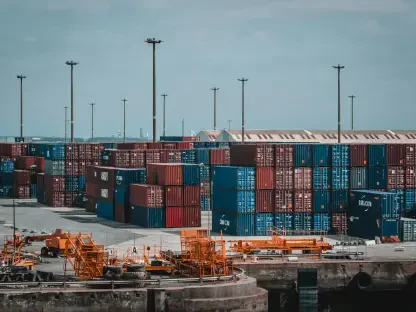The “2025 Commercial Real Estate Outlook” from Deloitte Center for Financial Services, authored by industry leaders Jeffrey J. Smith, Kathy Feucht, Renea Burns, Tim Coy, and Jim Eckenrode, delves into the evolving landscape of the commercial real estate (CRE) market and anticipates the sector’s transformation in the coming year. The report outlines how the sector will navigate economic recovery, investment trends, sustainability imperatives, talent acquisition, and the integration of advanced technologies like artificial intelligence (AI).
Topic and Subject of Analysis
The report provides a comprehensive analysis of the CRE industry’s current status and forecasts the opportunities and challenges it will face in 2025. It centers on economic recovery, investment trends, sustainability, talent acquisition, and the potential impact of advanced technologies like artificial intelligence (AI). This detailed examination aims to offer a holistic view of the sector’s future trajectory, helping stakeholders make informed decisions.
Common Themes and Key Points
Economic Recovery and Market Stability
The global economic recovery is uneven, varying significantly by region, with mixed GDP growth projections. Areas like India and Europe are expected to perform better than others like the United States. Declining inflation and the potential for reduced interest rates could provide stability for the CRE industry, making it a pivotal year for financial recovery and market stability.
Investment Opportunities
There is renewed optimism among CRE leaders for 2025, with expectations for increased revenues and spending. The report highlights key areas for capital deployment, including digital economy properties, logistics, industrial and manufacturing, multifamily housing, and hotels. This trend signals an optimistic investment climate, encouraging expansion and technological improvements.
Sustainability and Climate Resilience
The report underscores a growing financial imperative for sustainability. Deep energy retrofits and compliance with building performance standards (BPS) are highlighted as crucial strategies for making properties resilient to climate change while ensuring financial viability. Sustainability measures are no longer just regulatory requirements but are seen as drivers of long-term financial performance and asset value.
Talent and Workforce Changes
The CRE industry faces a potential “retirement cliff” with a significant portion of its workforce nearing retirement. Attracting next-generation talent requires aligning with their values concerning climate action and work-life balance, as well as investing in upskilling to meet modern technological demands. This shift is essential to addressing the talent gap and sustaining the industry’s growth.
Technological Integration and AI Adoption
The report discusses the nascent but accelerating adoption of AI within the CRE sector. AI’s potential to enhance efficiency, from financial planning to property operations, is emphasized, though data quality and standardization remain significant challenges. Proper data management is critical for fully harnessing AI’s transformative capabilities.
Overarching Trends and Consensus Viewpoints
Economic Sentiment Shift
There is a consensus that 2025 could mark a turnaround for the CRE industry, with improved economic conditions driving increased investment and property transactions. This sentiment of cautious optimism is supported by projections of varying GDP growth rates and anticipated interest rate cuts.
Focus on Technology and AI
There is an industry-wide recognition of the necessity to integrate AI and other digital technologies to stay competitive and efficient. The move toward AI is seen not just as optional but essential for operational excellence and strategic advantage.
Sustainability as a Financial Imperative
Sustainability is no longer just a regulatory requirement; it is increasingly seen as a driver of long-term financial performance and asset value. Deep energy retrofits and more stringent building performance standards are viewed as crucial strategies to achieve these sustainability goals.
Streamlining and Synthesizing Information
The article effectively consolidates various perspectives from global CRE leaders, surveys, and economic forecasts. Repetitive points about economic recovery and investment prospects are streamlined to focus on the consensus that improved conditions in 2025 will drive growth. Moreover, the synthesis incorporates the industry’s cautious optimism about AI and the need for proper data management to harness its benefits fully.
Summary of Main Findings
Economic and Market Recovery
Projections suggest varying levels of GDP growth across different regions, with some areas like India and Europe expected to perform better than others like the United States. This uneven growth, coupled with anticipated interest rate cuts, sets a cautiously optimistic stage for CRE recovery.
Investment Trends
CRE leaders expect a favorable investment climate in 2025, with increased budgets and a focus on sectors like digital economy properties and industrial facilities. Mergers and acquisitions are also anticipated to rise as companies look to scale and enhance technological capabilities.
Sustainability Initiatives
Deep energy retrofits and stringent BPS are prioritized to mitigate climate impact and avoid asset obsolescence. There’s a call for integrated approaches that align sustainability with core business strategies.
Workforce Evolution
Addressing the retirement cliff involves attracting younger talent by meeting their ethical and work-life expectations, coupled with robust upskilling initiatives to close the skills gap.
AI and Technology Integration
AI adoption is on the rise but requires significant improvements in data quality and standardization. Companies must prioritize data readiness to fully leverage AI’s potential in transforming operations.
Detailed, Coherent, and Logically Structured Summary
The “2025 Commercial Real Estate Outlook” from Deloitte Center for Financial Services, penned by industry experts Jeffrey J. Smith, Kathy Feucht, Renea Burns, Tim Coy, and Jim Eckenrode, examines the rapidly changing commercial real estate (CRE) market and forecasts significant transformations in the upcoming year. This comprehensive report explores how the sector will manage economic recovery, shifting investment trends, and the growing emphasis on sustainability. Furthermore, it addresses critical areas like talent acquisition and the adoption of cutting-edge technologies, including artificial intelligence (AI).
According to the report, the CRE market is poised to navigate a complex landscape influenced by multiple factors. Economic recovery is expected to drive new investment opportunities, while sustainability imperatives will push companies toward greener practices. The challenge of attracting and retaining talent will be crucial as firms adapt to new workplace norms. Additionally, AI and other advanced technologies are set to revolutionize operations and decision-making processes within the sector, paving the way for a more efficient and innovative future.









